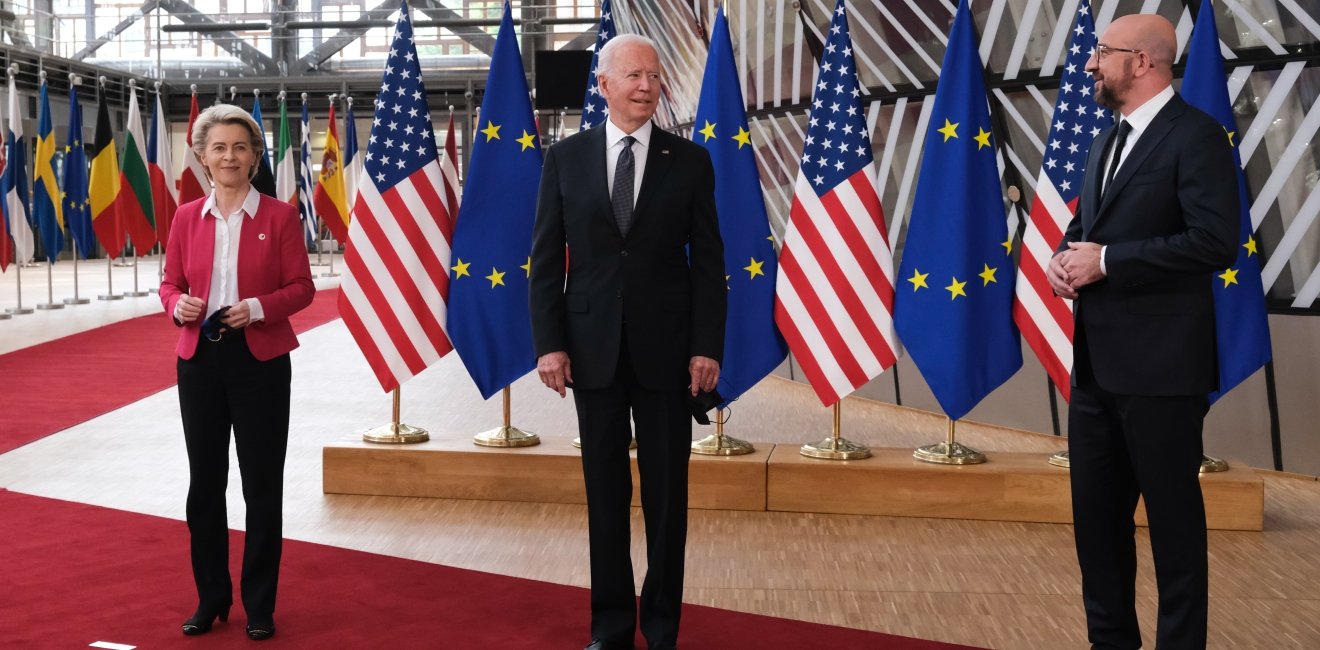Frequent riders of the Washington, DC Metro System will recall from 2016-2017 when operations were at an all-time low in quality, DC transit officials announced a sweeping plan to get “back to good” – not great or perfect, but better. The U.S.-EU Summit felt similar to the DC metro plan, modest steps in the right direction but it did not go far enough in other places. A number of irritants in the transatlantic relationship were removed and new avenues for cooperation in technology, trade, and climate policy emerged, yet many challenges still remain, such as lifting the U.S. travel ban on Europeans or fully resolving the numerous trade obstacles hindering the transatlantic economy. In short, U.S.-EU relations are now “back to good” – but there is still a lot of work to be done.
The joint statement released by the United States and the EU, a product of weeks of negotiations and planning, took considerable steps towards narrowing the gap between the two parties on trade, technology and climate policy, but it fell short in some regards. It was disappointing Biden did not lift the U.S. travel on Europeans nor announce any path to removing the ban, a ban that while necessary has resulted in the separation of families over the last year and half of COVID, as has been expertly described by Célia Belin in an article for Brookings. By the end of June, all 27 EU member states will have reopened their borders to American travelers, even going so far as to announce unvaccinated travelers from the United States will be allowed to enter the EU. However there is no indication from Washington when Europeans will be able to return to the United States, largely due to the slower vaccination rollout in the EU. Some good news came from this summit on this front; a working group will be formed to re-establish safe and sustainable travel between the two sides of the Atlantic, but at the very least some target date should have been announced to allow people’s lives to heal after an unprecedented global pandemic.
Big Day for Transatlantic Tech, Trade, and Climate Cooperation
The big wins from this summit for the U.S.-EU relationship came in the form of enhanced cooperation on technology, trade and addressing climate change. A new Trade and Technology Council (TTC) was announced that will create a platform for discussing tech issues. This was first proposed by the European Commission in December 2020 and is poised to allow the United States and the EU to create a united front against China. The TTC has a staggering mandate to resolve some of the largest disputes in the transatlantic relationship, but this new forum for cooperation is essential and long overdue. The two sides will also partner on semiconductors, with this year’s critical shortage of microchips due to the pandemic and changing consumer habits requiring action. This also allows the transatlantic allies to further show unity in the face of China, the world’s largest semiconductor market. The two sides committed to a U.S.-EU Joint Technology Competition Policy Dialogue, taking aim at competition policy and enforcement. In recent years, the EU has been leading the charge against Big Tech, but Washington and Congress have increasingly found itself at odds with Silicon Valley.
The transatlantic economy accounts for one third of global GDP in terms of purchasing power and employs up to 16 million people on both sides of the Atlantic. Yet despite these incredible economic linkages, a number of irritants from the past are holding back the transatlantic economy’s true potential. Biden did not remove Trump-era tariffs on European steel and aluminum, which had been imposed for reasons of “national security.” However, prior to the summit Biden had set a goal for December 1, 2021 to remove these lingering irritants. One festering issue in the transatlantic trade dynamic that saw some traction is the 17-year feud over subsidies between Airbus and Boeing. Despite media claiming the dispute has been settled, in reality the two sides simply agreed to a five-year ceasefire, kicking the can down the road. This ceasefire will prevent further escalation in tariffs and effectively buys more time for negotiators. In another jab against China, the United States and the EU committed to reforming the World Trade Organization (WTO), often citing the dysfunction of this body as contributing to China’s unfair economic practices.
Climate change featured heavily in the joint statement, a major reversal from the U.S. side when six months ago climate change was openly doubted by the previous administration. The United States and the EU reaffirmed their commitment to the Paris Agreement and its implementation, announcing a U.S.-EU High-Level Climate Action Group. The EU has been the world leader in climate advocacy in recent years, but the United States is now joining European allies by striving to become net zero greenhouse gases economies no later than 2050. The U.S.-EU Energy Council will continue as a coordinating body on strategic energy issues. Clean energy, energy efficiency, the decarbonization of the energy sector, and sustainable energy supply chains, and energy security will receive renewed attention. The United States and EU will work toward a Transatlantic Green Technology Alliance to promote the development and scaling of green technologies needed for a climate-neutral future. Lastly, the two sides announced they would enhance transatlantic cooperation on sustainable finance, a core component of the EU Green Deal, including providing tools and metrics to the private sector to support economic growth while limiting stress to the environment.
“Back to Good”?
Although the U.S.-EU Summit did not get the same fanfare as the G7 or NATO Summits, for those in the transatlantic space this was a solid step in the right direction, albeit not a huge leap forward. It demonstrated that the Biden administration can make tangible progress with allies. The U.S. and EU are back to good, but there is still more work ahead.
Author


Global Europe Program
The Global Europe Program is focused on Europe’s capabilities, and how it engages on critical global issues. We investigate European approaches to critical global issues. We examine Europe’s relations with Russia and Eurasia, China and the Indo-Pacific, the Middle East and Africa. Our initiatives include “Ukraine in Europe”—an examination of what it will take to make Ukraine’s European future a reality. But we also examine the role of NATO, the European Union and the OSCE, Europe’s energy security, transatlantic trade disputes, and challenges to democracy. The Global Europe Program’s staff, scholars-in-residence, and Global Fellows participate in seminars, policy study groups, and international conferences to provide analytical recommendations to policy makers and the media. Read more

Explore More
Browse Insights & Analysis
360° View of How Southeast Asia Can Attract More FDI in Chips and AI



